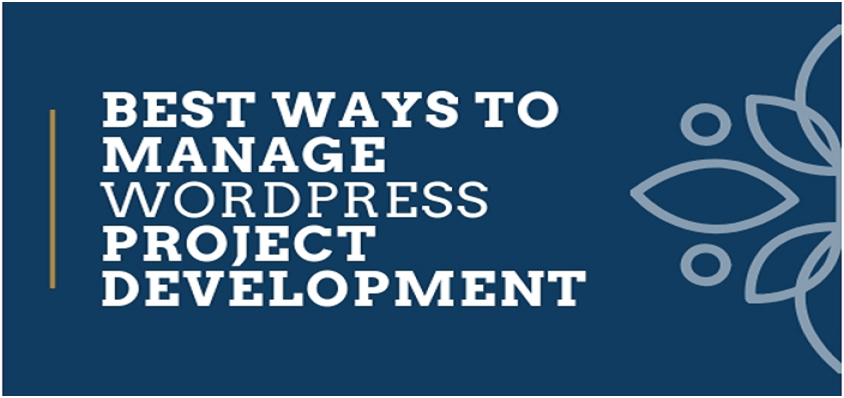Best Ways To Manage WordPress Project Development
WordPress, the King of Content Management Systems(CMS) is used for marketing, eCommerce, Customer-relationship management and other 1001 tasks. No wonder why WordPress developers rely on project management!
It facilitates the developers to deliver the project on time, on budget and with quality. The business model is designed in a way to gauge the average time for project completion, team size requirement, and the ongoing workflow with the team internally and also with the client.
You tend to get more organized in your work and coordinate with the team very easily. This, in turn, will increase the productivity of the organization and bring everyone in the loop including clients by sharing the information and progress.
People partner up with WordPress theme development agencies for many services like One-off project development, Maintenance contracts, ongoing development jobs, hiring developers part-time or full time, Ad-hoc requirements and more.
WordPress offers a creative solution for managing the projects directly from the dashboard.
It is very difficult to have everything in one place. As a WordPress website developer, we hate forgetting things and try to avoid server downtime while development.
To overcome this, we need strong project development that would ease out the process and reduce the risk of development. Things to consider while defining a WordPress project development are:
Segregate The Roles And The Responsibilities:
As a starter to WordPress, there is a need to ensure that you hire the right people for the job role. If you choose to go for a maintenance-driven contract, it might get challenging and limited. Because they would only work for around 10-15 hours over the project.
Such companies/agency entirely focus on niche development and maintenance, but hiring freelancers or having a small team is preferred initially.
You might face limitation in building complex features, migrating platforms, integrating third-party CRM/ERP solutions and more.
The requirement of the team depends on project complexity, urgency, and duration. The standard requirement for an eCommerce is:
- One project manager;
- 1-2 backend engineers
- 1-2 front-end engineers
- Designer
- QA expert
As you progress with the project, you will need system and networking engineers and other roles may also get add up.
Senior management if involved promises a potential of ROI. The WordPress development projects fall in either of the below mentioned four categories:
- WordPress SaaS/Multisite Development
- Scaling WordPress Magazines and Blogs
- Large WordPress Website Development
- Extensible WordPress plugin/framework Development
Let’s explore more on each of the categories requirement:
WordPress SaaS/Multisite Development:
This development requires a large number of servers and development environment customizations. The time required for initial set up is also very long.
You can set up the code on the Github or any other VCs platform preferred by the client. You can also include nginx, PHP-fpm, MySQL, email setup, iptables and also provide the server architecture on Amazon or Digital Ocean.
It is important to keep an eye on server utilization and memory consumption. For this, you can integrate Zabbix to monitor the consumption.
Using a custom local development environment or VVV, allows you to operate and develop to verify the latest changes before deployment.
If the third party API’s have to be integrated, you can set up a staging server that replicates your server stack.
We can clone or use the production database copy for staging testing. The reason behind doing this is, the local environment works faster and easier.
Scaling WordPress Magazines and Blogs:
WordPress, the powerful content management system was started long back in 2003 as a blogging platform. But with the evolution and capabilities enhancement, it empowers almost 33% of the web.
Due to its popularity, you as a developer may be encountered with the requirement from the publishers to generate millions or ten millions of monthly views.
In such situations when a struggling publisher approaches, you need to design the workflow in the following manner:
- Perform a thorough review and analysis of the user stories;
- Check out the existing approach, layouts, pictures, articles, and other stuff which can gather maximum traffic.
- Understand the problems and the stability issues faced by the team and take immediate action.
- Based on the monetary investment, include ads, optimize programmatic solutions for making more profits.
- You can refine the whole workflow with hotfixes, setting up version controlled repository and more.
Large WordPress Website Development
Most of the WordPress websites are built on production and staging servers. Maintain a GitHub repository for the project so that additional plugins and add-ons can be synced in the main environment.
You can also have a static folder defining the static resources for starting the frontend work. This helps in preventing regressions and unexpected bugs.
You can protect the staging server which will prevent the search engine bots from crawling.
Back up is a mandate for any project. Perform it using automated tools or from the hosting provider.
Allow the project to be monitored for the uptime and file updates.
Extensible WordPress plugin / Framework Development:
It is important to give a core version with necessary features on GitHub while you are dealing with modular plugins and frameworks.
You can create another repository for all extensions and add ons. You can tag the releases at every stage so that you can easily ship different versions whenever required.
Practicing this also allows you to merge branches and updates with the older version too.
If you use a modular version of WordPress, it includes many hooks that are easily detachable or modifiable.
Involving library-based modular infrastructure, you can drop-ins code snippets which are placed in the folder.
It is pretty obvious that while dealing with a huge site will require a lot of users and task management. No matter how well you plan the WordPress project development, always remember Murphy’s law, “Anything that can go wrong will go wrong”.
It may happen while dealing with the progress of development that you may have to go beyond roles to accomplish the task.
Do not hesitate. For any assistance, you can reach out to a WordPress development company or other. They will help you out in setting the project milestone and fine-tune every other aspect.






